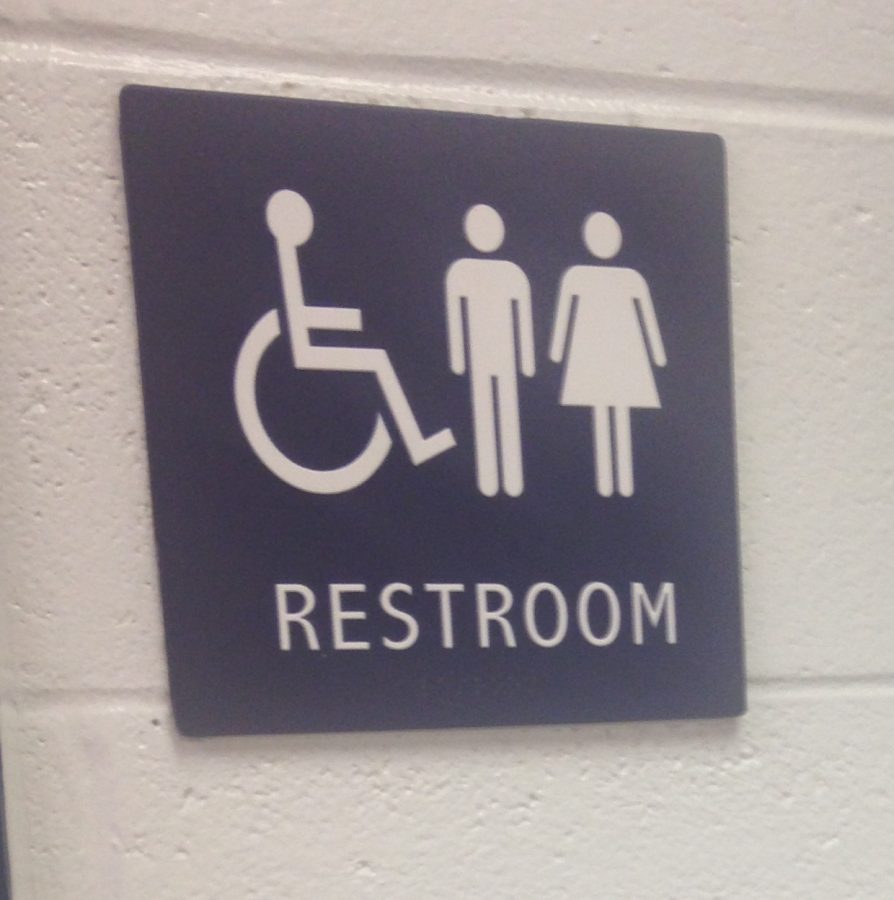Unisex bathroom and inclusion for PA transgender students
December 12, 2019
By Ana Costanzo
In a small office space carved into the lower 200 hall, a student greets a receptionist and types in a Chromebook with coded words: JADEN LAMB. MISCELLANEOUS.
Upon farther entering this sterile landscape of disease-stricken and yellow-marked men, Lamb goes deeper into the depths of the PAHS clinic, the fluorescent lights which trail the entryway switched off, darkness instead ebbing into the back recesses of the infirmary. The only light protrudes from window cracks covered by a white sheet; the hum of a mini-fridge echoes in the niches of Lamb’s mind as he walks to the solitary door of the restroom. He came here not to pronounce illness or fatigue or require a Band-Aid or even to lay down on the paper-covered metal beds. No, Lamb’s “miscellaneous” need is the bathroom, this solitude presenting an oasis of consolation and placidness otherwise unfound in the bathrooms speckled across PA, the stalls themselves unbecoming—a violation of privacy.
Here Lamb acquires a stress-free zone, the sign outside the bathroom devoid of sex labels. Here lies a haven for transgender students, a protection against judgment, paranoia, and embarrassment.
But entering into a sick-enriched habitat is hazardous for any healthy student such as senior student Lamb, who identifies as a male rather than his biological female sex.
“This is a sick environment—it’s not where healthy people should be walking into because of their chances of picking something up. Especially when it gets later into flu season,” said nurse Laura Dictado.
With the receptionist guarding the clinic, the nurses have a plethora of visiting students, the numbers up to 35-40 students a day as of 2019 (in 2015, it was 15-20 students a day, according to Dictado).
The recent traffic stemming from the clinic bathroom is not the sole cause for the efflux of the students. An increase in illness, too, presents possible unhealthy issues.
Dictado gestures to a side of the room when addressing such an increase in illness: “This side over here” is designated to students in medical need (this “side” implies the right portion of the clinic upon entering the room).
While there are priorities for the sick, the clinic still experiences backup when the bathroom is occupied on both sides, according to Dictado.
Regarding transgender accomodations in PA, there also is the issue of mandatory P.E. for freshman and sophomore students.
Uncomfortable changing in front of preferred transitional gender, Dictado reminiscences that in past years students would ask to change in the clinic bathroom.
“I don’t feel that students should have to be up here changing,” said Dictado, who appreciates the school making accommodations. “Leave their belongings (which I’m responsible for then), and go all the way to P.E. late, and have to come back here to change and go to their next class.”
Fortunately, head of the P.E. department James Hunt is responsible for acquiring a space for transgender students near the gymnasium (however, Dictado dealt with previous head of the P.E. department Denise O’Connell who left PA last year).
“We have a few rooms that a student can use,” said Hunt, eliminating the sex-distinguished locker rooms as potential changing areas. “We can make the girls varsity locker room available—whatever appropriate spaces we can find.” However, he clarified the P.E. facilities as lacking in space.
His recollection of past experiences regarding such accommodations were limited, as he only remembered one in the 2017-2018 school year.
Dictado, however, said two-to-three students came to the clinic regarding accommodations during the five-minute changing period during P.E. at the beginning of the 2019 school year.
Regardless, accommodations for transgender students were present in PA before the 2019 school year.
Officially hired in February 2016 from a long-term substitute teacher position, Dictado remembers the Virginia Beach City Public Schools administration switching the sex-designated bathroom to a unisex one. To carry out such a process, the signs for the two bathrooms in the clinic changed from stating specific genders to simply stating RESTROOM.
In 2018, a PA student emailed the principal, wanting “permission to use any bathroom in the school they saw fit,” according to Dictado. Principal Danny Little granted the permission. Such an email is a local triumph as Dictado addressed the transgender case in Gloucester prior to such a statement.
Such change alleviates an increase in “anxiety issues” seen through the conflicts transgender students struggle with through societal perception, according to Dictado.
“These bathroom doors lock. Nobody can come in or get at them.” Furthermore, Dictado expresses how transgender students experience the paranoia of society’s piercing glare.
Choosing the nurse bathroom over the gender-distinguished bathrooms across PA, Lamb prefers the former because of such protection from societal watch dogs.
“Having to use the stall, and being afraid of them hearing me peeing while sitting down…I’m always a little paranoid they’re going to notice.”
This constant fear of judgment plagues Lamb and other transgender students who “just avoid using the bathroom at school” altogether, according to Lamb.
Doubtless an inconvenience, this singular unisex bathroom has a higher commute time than the surrounding school bathroom locations, according to Lamb, especially when he is on the other side of the building or even in the portables.
Recently, Lamb has relied on the male bathroom in the school more than the nurse bathroom, confidence in masculinity driving such a decision. However, the latter is “easier” when anxiety pressures Lamb.
Though becoming more accustomed with his transitional-gender bathroom, Lamb was not “comfortable using the men’s bathroom” prior to such a decision. Thus, Lamb discussed alternatives with his guidance counselor. Hence, the clinic bathroom introduced itself into Lamb’s universe. (Access to the administrator’s bathroom was a negative.)
While Lamb is “pass enough to be able to use the men’s bathroom without being afraid,” suggesting his stage of discomfort and fear as diminishing, confidence uprooting itself in his emotional well-being, a unisex bathroom would lessen stress for all transgender students.
Justifying the need for a unisex bathroom, Dictado said, “A transgender student needs to feel when going to the bathroom that they’re in a safe place, that it’s just them.”
With PA’s upcoming 2023 renovation, Senior Executive Director High Schools Daniel F. Keever told The Page he is certain a discussion will accumulate with “stakeholders from the school” such as students, teachers, and administrators regarding how to “best meet the restroom needs of the students and staff.”




